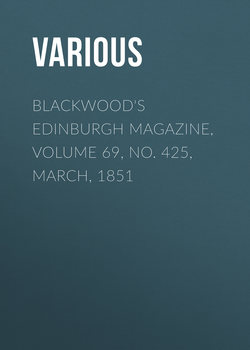Blackwood's Edinburgh Magazine, Volume 69, No. 425, March, 1851

Реклама. ООО «ЛитРес», ИНН: 7719571260.
Оглавление
Various. Blackwood's Edinburgh Magazine, Volume 69, No. 425, March, 1851
THE DANGERS OF THE COUNTRY. NO. II. – OUR INTERNAL DANGERS
MY NOVEL; OR, VARIETIES IN ENGLISH LIFE. BY PISISTRATUS CAXTON
CHAPTER II
CHAPTER III
CHAPTER IV
CHAPTER V
CHAPTER VI
CHAPTER VII
CHAPTER VIII
CHAPTER IX
CHAPTER X
CHAPTER XI
CHAPTER XII
LEGENDS OF THE MONASTIC ORDERS, AS REPRESENTED IN THE FINE ARTS.21
LAVENGRO.22
THE ARTS IN PORTUGAL.23
SOUTHEY.25
THE MINISTRY AND THE AGRICULTURAL INTEREST
Отрывок из книги
"It was no bad idea of yours, Pisistratus," said my father graciously, "to depict the heightened affections and the serious intention's of Signior Riccabocca by a single stroke —He left off his spectacles! Good."
"Yet," quoth my uncle, "I think Shakspeare represents a lover as falling into slovenly habits, neglecting his person, and suffering his hose to be ungartered, rather than paying that attention to his outer man which induces Signior Riccabocca to leave off his spectacles, and look as handsome as nature will permit him."
.....
For the first few days, Riccabocca scarcely permitted any one to be with his daughter but himself. He would not even leave her alone with his Jemima. They walked out together – sat together for hours in the Belvidere. Then by degrees he began to resign her more and more to Jemima's care and tuition, especially in English, of which language at present she spoke only a few sentences, (previously, perhaps, learned by heart,) so as to be clearly intelligible.
There was one person in the establishment of Dr Riccabocca, who was satisfied neither with the marriage of his master nor the arrival of Violante – and that was our friend Lenny Fairfield. Previous to the all-absorbing duties of courtship, the young peasant had secured a very large share of Riccabocca's attention. The sage had felt interest in the growth of this rude intelligence struggling up to light. But what with the wooing, and what with the wedding, Lenny Fairfield had sunk very much out of his artificial position as pupil, into his natural station of under-gardener. And on the arrival of Violante, he saw, with natural bitterness, that he was clean forgotten, not only by Riccabocca, but almost by Jackeymo. It was true that the master still lent him books, and the servant still gave him lectures on horticulture. But Riccabocca had no time nor inclination now to amuse himself with enlightening that tumult of conjecture which the books created. And if Jackeymo bad been covetous of those mines of gold buried beneath the acres now fairly taken from the Squire, (and good-naturedly added rent-free, as an aid to Jemima's dower,) before the advent of the young lady whose future dowry the produce was to swell – now that she was actually under the eyes of the faithful servant, such a stimulus was given to his industry, that he could think of nothing else but the land, and the revolution he designed to effect in its natural English crops. The garden, save only the orange-trees, was abandoned entirely to Lenny, and additional labourers were called in for the field-work. Jackeymo had discovered that one part of the soil was suited to lavender, that another would grow camomile. He had in his heart apportioned a beautiful field of rich loam to flax; but against the growth of flax the Squire set his face obstinately. That most lucrative, perhaps, of all crops, when soil and skill suit, had, it would appear, been formerly attempted in England much more commonly than it is now; since you will find few old leases which do not contain a clause prohibitory of flax, as an impoverishment of the land. And though Jackeymo learnedly endeavoured to prove to the Squire that the flax itself contained particles which, if returned to the soil, repaid all that the crop took away, Mr Hazeldean had his old-fashioned prejudices on the matter, which were insuperable. "My forefathers," quoth he, "did not put that clause in their leases without good cause; and as the Casino lands are entailed on Frank, I have no right to gratify your foreign whims at his expense."
.....